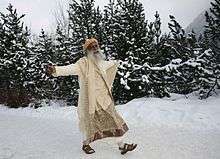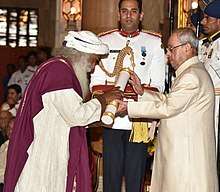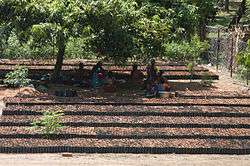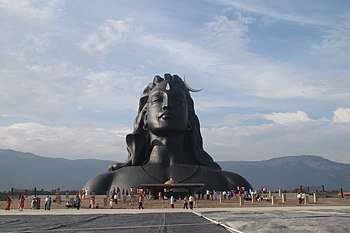Jaggi Vasudev
Jaggi Vasudev (born 3 September 1957),[2] known publicly as Sadhguru,[2][lower-alpha 1] is an Indian yogi and author.[6][7][8]
Sadhguru Jaggi Vasudev | |
|---|---|
.jpg) Sadhguru in 2019 | |
| Born | 3 September 1957 |
| Nationality | Indian |
| Organization | Isha Foundation |
Notable work |
|
| Spouse(s) | Vijaya Kumari (Vijji)
( m. 1984; death 1997) |
| Children | 1 |
| Honors | Padma Vibhushan Indira Gandhi Paryavaran Puraskar |
| Website | isha |
Vasudev earned a bachelor's degree in English from the University of Mysore and has been teaching yoga in southern India since 1982. In 1992, he established Isha Foundation near Coimbatore, which runs an ashram, hosts a yoga centre, and has been involved in various activities in spirituality, education, and the environment.
Vasudev is the author of several books, including Inner Engineering: A Yogi's Guide to Joy (2016). As a public speaker he has spoken at the United Nation's Millennium World Peace Summit, the British parliament's House of Lords, the Massachusetts Institute of Technology, and the International Institute for Management Development. He has also spoken at the annual World Economic Forum in 2007, 2017 and 2020.
In 2017, he was awarded the Padma Vibhushan, India's second highest civilian award, by the Government of India for his services in social services.
Biography
Early life and education
Jaggi Vasudev was born on 3 September 1957 in Mysore, Karnataka, India to a Telugu speaking family.[9] He was the youngest of four children – two boys and two girls. His mother was a housewife and his father an ophthalmologist with Indian Railways.[10] Due to the nature of his father's job, the family moved frequently.[11]
After his schooling at Demonstration School, Mysore and Mahajana Pre-University College, Vasudev graduated from the University of Mysore with a bachelor's degree in English, despite a spotty attendance record and an irreverent attitude to tuition.[12] Defying his parents wishes, he refused to pursue a post-graduate course and took to business instead.[13]
Spirituality
Aged thirteen, Yasudev took yoga lessons from Malladihalli Raghavendra, and kept practicing asanas and pranayama[14] daily throughout his youth, albeit without spiritual aspirations.[15] At the age of 25, on 23 September 1982, he went up Chamundi Hill and sat on a rock, where he had a 'spiritual experience'.[13] Six weeks afterwards, he left his business to his friend and travelled extensively in an effort to gain insight into his mystical experience.[13] After about a year of meditation and travel, he decided to teach yoga to share his inner experience.[13]
In 1983, he taught his first yoga class with seven participants in Mysore. Over time, he began conducting yoga classes across Karnataka and Hyderabad travelling on his motorcycle, subsisting on the produce of his poultry farm rental and donating the collections received from his students to a local charity on the last day of the class.[13]
Family
.jpg)

Jaggi Vasudev was married to Vijaya Kumari, known by her nickname Vijji. This was Kumari's second marriage. Prior to marrying Vasudev she worked in a bank, a position she retained until early 1996.[16] The couple had a daughter named Radhe. Kumari died on 23 December 1997. At that time her father alleged that Vasudev had murdered her; Vasudev asserted that she had attained mahasamadhi and claimed she had told him about it nine months before her death.[17][18] The police investigation found no fault in him.[17]
Vasudev's daughter Radhe Jaggi, born 1990,[19] is a trained bharatanatyam dancer.[20] She married Chennai-based classical vocalist Sandeep Narayan in 2014.[21]
Books and public engagement
Jaggi Vasudev is the author of several books. His Inner Engineering: A Yogi's Guide to Joy[22] made The New York Times Best Seller list in several categories.[23] [24][25] Vasudev is also the author of Mystic's Musings[26] and Death: An Inside Story.[27][28]
Vasudev is a frequent public speaker who has been invited to address many prestigious forums and conferences across the globe, such as the United Nation's Millennium World Peace Summit, the House of Lords, the Massachusetts Institute of Technology, and the International Institute for Management Development.[29] He has also spoken at the annual World Economic Forum in 2007,[30] 2017 and 2020.[31][32]
Honours

Vasudev received the Padma Vibhushan, the second-highest civilian award from the Government of India in 2017 in recognition of his contribution to the field of spirituality.[33][34] He stood 92nd in The Indian Express' list of 100 most powerful Indians, in 2012 and stood 40th in India Today’s list of 50 most powerful Indians, in 2019.[35][36]
Isha Foundation
Located on the foothills of the Velliangiri Mountains, forty kilometres from the city of Coimbatore in the state of Tamil Nadu, South India,[37] Isha Foundation was established as a non-profit organisation by Jaggi Vasudev in 1992.[7] Its social initiatives have been awarded with the Rashtriya Khel Protsahan Puraskar.[38]
Yoga programmes

After the establishment of the ashram, Vasudev began conducting yoga programmes on the premises of the newly established Isha Yoga Centre in 1994, including a course for the Indian Hockey team in 1996.[39][40] In 1997, he began conducting classes in the United States[41][42] and from 1998 onwards, for life-term prisoners in Tamil Nadu prisons.[43][44]
The flagship program is titled 'Inner Engineering', which introduces people to simple Yoga practices and the Shambhavi Mahamudra;[45] corporate leadership forms a core audience of these programs.[46] It views depression as the result of a false widespread belief about an ability to change the world according to one's desires, and offers to teach the technology of mental well-being, to help one acclimatise with unavoidable work rigors.[47] Vasudev has frequently cited a study by the University of California which supposedly found mahamudra to lead to highly elevated levels (221%) of neuronal regeneration in the brain; it has since been noted that the study appeared in a fringe journal published by a discredited alternative medicine advocate and his allies, and that it merely reports lower levels of subjective stress from a medium-sized uncontrolled group practising yoga daily for six weeks.[48][49]
The Dhyanalinga
The Dhyanalinga (composed of the terms dhyāna and linga) is a consecrated sculptural stone structure standing 4.3 metres (13 feet 9 inches) tall.[50] Its creation and consecration, according to Vasudev, was his life's mission entrusted to him by his guru, Palani Swami.[13] In 1998, the structure of the Dhyanalinga was ordered and arrived at the ashram, where the Dhyanalinga Yogic Temple was being built to hold it.[51] After three years of work, the temple was completed on 23 June 1999[52] and opened to the public on 23 November.[53]
The Dhyanalinga Yogic Temple is a meditative space which is not dedicated to any particular faith or belief system,[54] and is open to all visitors irrespective of their religion or nationality.[55] A stone pillar named the Sarva Dharma stambha, located at the temple's front entrance, features symbols of several religions to indicate the venue's universality.[56][57]
Adiyogi Shiva statue
Designed by Vasudev, the foundation built a 34-metre-tall (112 ft) and 500-tonne (490-long-ton; 550-short-ton) Shiva statue for inspiring and promoting yoga. It was inaugurated by the Prime Minister of India, Narendra Modi[58] and has been since recognised as the "Largest Bust Sculpture" by Guinness World Records.[59] It is a part of the Incredible India campaign.[60]
The Tamil Nadu government has since claimed the entire construction as illegal, for which no approval was granted;[61] Comptroller and Auditor General's report further states the construction to have flagrantly violated the rules of biodiversity zones.[62][63][64]
Events
Vasudev regularly conducts gatherings (mahasathsangs) in the Indian states of Tamil Nadu and Karnataka.[65] He also takes spiritual aspirants on annual pilgrimages (yatras) to Mount Kailash and the Himalayas.[66][67]
Every year at the Isha Yoga Centre, Vasudev celebrates an all-night Mahashivarathri, the annual Hindu festival in honour of Shiva. It is estimated that these celebrations were attended by as many as 800,000 people in 2013.[68][69][70] He has also established a Linga Bhairavi temple in Coimbatore where women conduct the rituals.[71]
Educational and social initiatives
Isha Vidhya, an education initiative, aims to raise the level of education and literacy in rural India by providing quality English-language-based, computer-aided education. There are seven Isha Vidhya Schools in operation which educate around 3,000 students.[72]
The foundation also runs an Action for Rural Rejuvenation program, in over 4200 villages, raising the welfare of the underprivileged.
Environmental initiatives
Isha Foundation has consultative status with the UN Economic and Social Council,[73] and is an accredited observer of the UN Convention to Combat Desertification.[74] Narendra Modi, Prime Minister of India, praised the efforts by foundation for carrying forward Swachh Bharat Mission in Tamil Nadu.[75]
Project GreenHands

Project GreenHands (PGH) was established in 2004 as an environmental organisation. Its activity is largely focused on Tamil Nadu. The organisation received the Indira Gandhi Paryavaran Puraskar, the Government of India's environmental award in 2010.[76] The organisation's activities include agroforestry, plant nurseries in schools,[77] and tree-planting in urban centres such as Tiruchirappalli[78] and Tiruppur.[79]
Rally for Rivers
The Rally for Rivers campaign, which ran from September to October 2017,[80] intended to rejuvenate India's depleting rivers by growing large forests along their banks. Promoted by Vasudev all over the country, the campaign received support from a broad range of celebrities and the urban populace.[81] MOUs were signed with state governments.
However, the campaign has been widely criticised by environmentalists for lacking in scientific basis and shifting the spotlight away from real concerns.[82] Acclaimed water conservationist Rajendra Singh alleges that the campaign is motivated by the goal of money and fame.[83]
Cauvery Calling
The Cauvery Calling project aims to support farmers in planting an estimated 2.4 billion trees through agroforestry, thereby covering one third of Cauvery basin with trees, as a means of conserving it. The project has received acclaim from politicians and members of the movie industry.
However, environmentalists and public intellectuals allege that the program presents a simplistic view of river conservation, sidesteps social issues, and has the potential to harm tributaries and wildlife habitats.[84][85][86] A Public Interest litigation has also been filed in the Karnataka High Court questioning the legality of the fundraising practices for the initiative, and the usage of government owned land for a private purpose without supporting study.[87][88][89][90] In January 2020, the High Court ruled that the Foundation needed to disclose details of its fundraising practices relating to the initiative.[91]
Reception
Critics claim that Vasudev shares the ideology of Bharatiya Janata Party's Hindu nationalism (Hindutva),[48][92][93][94][95] and that he takes an "intolerant nationalist" stance in his media appearances.[92] He advocates a total ban on cow slaughter and characterises the era of Muslim Rule in India as an "oppressive occupation" that was far worse than the British Raj.[48] Vasudev has also spoken in favour of the 2019 Balakot airstrike, the introduction of a comprehensive GST, and the Citizenship (Amendment) Act, 2019, while denouncing the Thoothukudi protests as a peril to industry.[48][96][97][98] Vasudev accuses leftist liberals of aiding and abetting militancy in Kashmir, and has suggested that Kanhaiya Kumar and Umar Khalid, known for their involvement in the JNU sedition row, should be put behind bars.[99] His understanding of politics and history has been repeatedly questioned.[92][97][48]
Vasudev has also been accused of promoting superstition and misrepresenting science.[100][101][48] He propagates the claim, unsupported by science, that cooked food consumed during lunar eclipses depletes the human body's pranic energies.[48][102][103][104] He also perpetuates numerous myths regarding clinical depression, and opposes the potential prohibition on the use of mercury in traditional Indian medicine, despite the substance's extreme toxicity.[105][106] His views on the Higgs boson and alleged benefits of vibhuti have been rejected as unproven by science.[107][108] Moreover, he propounds theories of water memory that are not supported by science.[109] In addition, Vasudev has been accused of popularising Hindutva's revisionist history of a golden Hindu past; of fundamentally misinterpreting Darwin's work as a Western appropriation of ancient Indian wisdom; of advocating for Hindu death rituals; and of claiming that Hindu Tantrics are capable of raising the dead.[48]
Notes
References
- "Family Matters - Sadhguru Speaks About His Family". Isha Foundation. Retrieved 14 February 2018.
- Waghorne 2013, p. 297; Foreword by Pat MacEnulty in Simone & Vasudev 2008, p. 10
- Sanghvi, Rajesh D (2018), Going Beyond My Guru's for Human Welfare, Notion Press, p. 30, ISBN 978-1-64429-901-2
- Cornille, Catherine (1992), The Guru in Indian Catholicism: Ambiguity of Opportunity of Inculturation?, Wm. B. Eerdmans Publishing, p. 103, ISBN 978-0-8028-0566-9
- Shantipriyadas, S. (1998). Pramukh Swami Maharaj (2nd ed.). Amdavad: Swaminarayan Aksharpith. p. 307. ISBN 81-7526-000-9.
- IANS (9 October 2016). "Don't vote as part of a tribe, Jaggi Vasudev tells Americans". Business Standard India. Retrieved 30 June 2017.
- "The most powerful Indians in 2009: 80–84". Indian Express. 9 March 2009. Archived from the original on 28 January 2011. Retrieved 22 January 2020.
- Rao, Mallika (4 April 2018). "Why I Hate Gurus". New York (magazine). Vox Media. Retrieved 2 January 2020.
- Subramaniam 2013, p. 30, 31.
- Sadhguru (2016). Inner Engineering A Yogi's guide to joy. New York: Spiegel & Grau. pp. 14–21. ISBN 9780812997804.
- Subramaniam 2013, p. 32.
- Subramaniam 2013, p. 71.
- Simone, Cheryl (2008). Midnights with the Mystic. Hampton Roads Publishing Company. ISBN 978-1-57174-561-3.
- Subramaniam 2013, p. 73.
- Subramaniam 2013, pp. 38–39.
- Subramaniam 2013, p. 146.
- यादव, ज्योति. "दुनिया के हर विषय पर फाइनल बात बोलने के लिए कितनी पढ़ाई की आवश्यकता है?". The Print.
- "Congress IT cell chief rakes up old murder charge against Sadhguru; Isha Foundation dismisses it as 'baseless charge'". The Week. Retrieved 2 January 2020.
- Subramaniam 2013, p. 105.
- Naidu, Jaywant (26 November 2017). "When beauty comes to life". Deccan Chronicle. Retrieved 27 February 2020.
- Sangeetha, P (24 October 2014). "Sadhguru's daughter gets married in Kovai". The Times of India. Retrieved 27 February 2020.
- "Don't vote as part of a tribe, Jaggi Vasudev tells Americans". Business Standard. IANS. Retrieved 20 November 2016.
- "Health". The New York Times.
- "Religion, Spirituality and Faith". The New York Times.
- "New York Times Bestsellers - Advice, How-To & Miscellaneous: New this week INNER ENGINEERING". New York Times. 9 October 2016. Retrieved 9 May 2018.
- "Tantra between the covers". The Hindu. 15 July 2005. ISSN 0971-751X. Retrieved 13 March 2020.
- "Spiritual leader Sadhguru's new book to demystify death". Outlook (India). Retrieved 13 March 2020.
- "Maha Shivratri 2020: VP Venkaiah Naidu joins Sadhguru in celebrations at Isha Foundation". Free Press Journal. Retrieved 13 March 2020.
- Hudson & Hudson 2017, p. 2
- Chandrasekhar, Anand. "Indian gurus and their Swiss watches: a history". SWI swissinfo.ch. Retrieved 3 February 2020.
- "Sadhguru to Deliver Keynote, Conduct Meditation Session at Davos Summit". News18. Retrieved 27 January 2020.
- "Golf with the Guru". The Hindu. 15 March 2009. ISSN 0971-751X. Retrieved 27 January 2020.
- "Jaggi Vasudev, Mariyappan among Padma award winners". The Hindu. 26 January 2017. Retrieved 31 January 2018.
- "Padma Vibhushan award for Sharad Pawar and Jaggi Vasudev". Deccan Chronicle. 26 January 2017. Retrieved 31 October 2018.
- "The most powerful Indians in 2012: No. 91-100 - Indian Express". archive.indianexpress.com. Retrieved 27 January 2020.
- MG Arun; Shwweta Punj; Suhani Singh; Kaushik Deka; Prachi Bhuchar; Chinki Sinha; Anshuman Tiwari; Sandeep Unnithan; Amarnath K. Menon; Anilesh S. Mahajan; Uday Mahurkar (26 July 2019). "Top 50 power people | The High & Mighty Part-4". India Today. Retrieved 13 March 2020.
- Berghella 2018, p. 69
- "Rashtriya Khel Protsahan Puraskar for Isha Outreach". The New Indian Express. Retrieved 13 March 2020.
- "Morale-Booster says Bhaskaran". Indian Express. 26 November 1996.
- "Refreshed Team Begins Final Preparation". The Hindu. 2 December 1996.
- Hamburg, Jay (15 October 1997). "Yoga guru touts peace, not religion" (PDF). The Tennessean. pp. 1B–2B. Archived from the original (PDF) on 3 March 2020.
- "It doesn't take a guru to know which way the stress flows". Dayton Daily News. 17 March 1998.
- "Yoga Brings 'Freedom' to Prisoners". The Hindu. 16 February 1998.
- Mark Singleton; Ellen Goldberg (6 November 2013). Gurus of Modern Yoga. Oxford University Press. pp. 283–295. ISBN 978-0-19-993871-1.
- "In pursuit of peace of mind". Daily News and Analysis. 20 January 2011. Retrieved 25 January 2011.
- "The route to 'dharmacracy'". Business Today. 27 November 2008. Retrieved 25 January 2011.
- Kapur, Jyotsna (2013). "For Some Dreams a Lifetime is Not Enough: The Rasa Aesthetic and the Everyday in Neoliberalism". The Politics of Time and Youth in Brand India: Bargaining with Capital. Anthem Press. p. 89. ISBN 978-0-85728-109-8. JSTOR j.ctt1gxpc43.
- Shahane, Girish (20 June 2019). "Opinion: The disturbing irrationalism of Jaggi Vasudev". Scroll.in. Retrieved 31 December 2019.
- Peterson, Christine Tara; Bauer, Sarah M.; Chopra, Deepak; Mills, Paul J.; Maturi, Raj K. (22 September 2017). "Effects of Shambhavi Mahamudra Kriya , a Multicomponent Breath-Based Yogic Practice ( Pranayama ), on Perceived Stress and General Well-Being". Journal of Evidence-Based Complementary & Alternative Medicine. 22 (4): 788–797. doi:10.1177/2156587217730934. ISSN 2156-5872. PMC 5871312. PMID 29228793.
- Berghella 2018, p. 74
- Berghella 2018, p. 70
- "Dhyanalingam installed". Indian Express. 26 July 1999.
- "A multi religious temple". The Hindu. 19 November 1999.
- Rangaswamy, Sudhakshina (25 July 2003). "Transformation of the inner Self". The Hindu. Retrieved 4 June 2011.
- Berghella 2018, p. 72
- Ganapathy, T.K. (28 September 2001). "Haven for the spiritually inclined". The Hindu. Archived from the original on 27 January 2013. Retrieved 4 June 2011.
- "Haven for the Spiritually Inclined - The Hindu - 28 September, 2001 - Isha Foundation". beta.ishafoundation.org. Isha Foundation. Retrieved 17 January 2020.
- "PM Narendra Modi unveils first 112-foot tall Shiva statue in Coimbatore". The Financial Express. 24 February 2017. Retrieved 1 March 2017.
- "Largest bust (sculpture)". Guinness World Records.
- Team, DNA Web (24 February 2017). "Maha Shivratri 2017: PM Modi unveils 112-foot Shiva statue in Coimbatore". DNA India. Retrieved 13 March 2020.
- "Isha's Shiva statue has no approval, buildings illegal: TN government takes a stand". The News Minute. 1 March 2017. Retrieved 6 March 2017.
- "CAG pulls up Tamil Nadu forest department over unapproved construction by Isha Foundation in protected zone". Firstpost. Retrieved 31 December 2019.
- Kumar, B. Aravind (12 July 2018). "Isha Foundation flouted norms: CAG". The Hindu. ISSN 0971-751X. Retrieved 31 December 2019.
- "But Why Is the Cauvery Calling?". The Wire. Retrieved 2 January 2020.
- "Isha's Green Salem goes on stream". The Hindu. 14 December 2010. Retrieved 25 January 2011.
- "Isha shows the way". Indian Express. 29 June 2009. Retrieved 25 January 2011.
- "Mansarovar is beyond words". Daily News and Analysis. 1 September 2010. Retrieved 25 January 2011.
- Zakaria, Namrata (June 2013). "The Lure of Isha" (PDF). Harpers Bazaar. pp. 106–108. Retrieved 26 September 2013.
- Zakaria, Namrata (14 March 2013). "Fashion label to 'yogi': Donna Karan on an Indian holiday". The Indian Express. Retrieved 26 September 2013.
- Vyas, Sheetal (1 April 2013). "Holy Days". Outlook. Archived from the original on 27 September 2013. Retrieved 26 September 2013.
- "Ma Linga Bhairavi temple in Coimbatore allows only women to perform pooja even during menstruation". The New Indian Express. Retrieved 13 March 2020.
- "LIC gives grant to Isha". The Hindu. 7 April 2010. Archived from the original on 10 April 2010. Retrieved 2 February 2010.
- United Nations Economic and Social Council (1 September 2010). "List of non-governmental organizations in consultative status with the Economic and Social Council as of 1 September 2010" (PDF).
- "Isha Foundation | Knowledge Hub". knowledge.unccd.int. Retrieved 13 March 2020.
- India, Press Trust of (15 September 2018). "PM praises Sadhguru for carrying forward Swachh Bharat in TN". Business Standard India. Retrieved 16 March 2020.
- Award for Project Green Hands Archived 2011-05-21 at the Wayback Machine, The Hindu, 8 June 2010, retrieved on 8 June 2010
- "Isha's Green School Movement kicks-off in Kanchi dist". The New Indian Express. Retrieved 15 August 2018.
- Reporter, Staff (4 October 2010). "Green Tiruchi Movement seeks to rectify ailing environment". The Hindu. ISSN 0971-751X. Retrieved 15 August 2018.
- "Stalin inaugurates Green Tirupur Movement". The Hindu. 25 August 2009. ISSN 0971-751X. Retrieved 15 August 2018.
- Thirumurthy, Priyanka (6 September 2017). "'Why tree planting is not the answer': Experts question Jaggi's 'shallow' Rally for Rivers". The News Minute. Retrieved 2 January 2020.
- "Rally for Rivers: Isha Foundation's campaign has good intentions but minimal scientific backing". Firstpost. Retrieved 31 December 2019.
- Sources criticizing the program:-
- "Rally for Rivers: Isha Foundation's campaign has good intentions but minimal scientific backing". Firstpost. Retrieved 31 December 2019.
- "Jaggi Vasudev's 'Rally for Rivers' Will Worsen the Problem It Plans to Tackle". The Wire. Retrieved 31 December 2019.
- Harsha, J. "Forests won't do the trick for rivers". @businessline. Retrieved 31 December 2019.
- Thirumurthy, Priyanka (6 September 2017). "'Why tree planting is not the answer': Experts question Jaggi's 'shallow' Rally for Rivers". The News Minute. Retrieved 2 January 2020.
- "The Empty Environmentalism of 'Rally for Rivers'". The Wire. Retrieved 2 January 2020.
- "How an Indian Guru Aims to Clean the World's Most Polluted Rivers". National Geographic News. 21 March 2018. Retrieved 2 January 2020.
- Krishnan, Priyanka Runwal and Lalitha (14 October 2017). "Do trees make rivers flow?". The Hindu. ISSN 0971-751X. Retrieved 2 January 2020.
- "Indian guru's drive to save rivers is timely but questionable". The National. Retrieved 3 January 2020.
- Staff, Scroll. "Jaggi Vasudev's rivers campaign meant for fame, power, money, says India's 'Waterman' Rajendra Singh". Scroll.in. Retrieved 2 January 2020.
- "Cauvery Calling: NGOs urge Leonardo DiCaprio to withdraw support". The Hindu. Special Correspondent. 25 September 2019. ISSN 0971-751X. Retrieved 7 October 2019.CS1 maint: others (link)
- "Civil Society Groups Ask Leonardo DiCaprio to Revoke Support for 'Cauvery Calling'". The Wire. Retrieved 14 October 2019.
- "N Ram questions Jaggi Vasudev's Cauvery Calling, asks why it shifts goal posts". The News Minute. Retrieved 2 January 2020.
- Plumber, Mustafa (18 September 2019). "Karnataka High Court Issues Notice On PIL Challenging Fund Collection For 'Cauvery Calling' Project". livelaw.in. Retrieved 7 October 2019.
- "PIL filed against Cauvery Calling campaign". Deccan Chronicle. 14 September 2019. Retrieved 7 October 2019.
- "PIL to cap cash collection for 'Cauvery Calling' project". The New Indian Express. Retrieved 7 October 2019.
- "HC notice to State on plea to examine Isha Foundation's 'Cauvery Calling' project". The Hindu. Special Correspondent. 18 September 2019. ISSN 0971-751X. Retrieved 7 October 2019.CS1 maint: others (link)
- "Disclose details of money collected under 'Cauvery Calling': HC to Isha Foundation". The New Indian Express. 8 January 2020. Retrieved 25 February 2020.
- "Why Hindutva Nationalists Need a Sadhguru". The Wire. Retrieved 2 January 2020.
- Poruthiyil, Prabhir Vishnu (3 August 2019). "Big Business and Fascism: A Dangerous Collusion". Journal of Business Ethics. doi:10.1007/s10551-019-04259-9. ISSN 1573-0697.
- Gopalakrishnan, Shankar (2006). "Defining, Constructing and Policing a 'New India': Relationship between Neoliberalism and Hindutva". Economic and Political Weekly. 41 (26): 2803–2813. ISSN 0012-9976. JSTOR 4418408.
- Waghmore, Qudsiya Contractor & Suryakant. "How Jaggi Vasudev has helped strengthen fears about Muslims". Scroll.in. Retrieved 13 January 2020.
- "Jaggi Vasudev's CAA Video: 22 Minutes of Half-Truths & Gaslighting". The Quint. 31 December 2019. Retrieved 3 January 2020.
- "An (Un)Enlightened Sadhguru in King Modi's Court". The Wire. Retrieved 3 January 2020.
- Staff, Scroll. "Watch: Jaggi Vasudev wants students to read CAA before protesting, but hasn't read it himself". Scroll.in. Retrieved 3 January 2020.
- Basu, Joyeeta (5 March 2019). "Fuelling peace with hatred". The Asian Age. Retrieved 2 January 2020.
- "Jaggi Vasudeva doesn't understand science". Nirmukta.
- "Should Sadhguru be Hosted by India's Top Colleges?". The Quint. 17 September 2018. Retrieved 31 December 2019.
- Mukunth, Vasudevan (8 August 2017). "This Is No Way to Remember P.M. Bhargava and Yash Pal". The Wire. Retrieved 31 December 2019.
- Sutar, Prayas (3 February 2018). "How to spread lunar eclipse superstition using science, Sadhguru explains". Newslaundry. Retrieved 31 December 2019.
- Tharoor, Shashi. "Science is not your enemy". Mathrubhumi. Retrieved 1 January 2020.
- Shaikh, Dr Sumaiya (26 February 2018). "Scientific research ascertains mercury toxicity but Sadhguru continues to endorse it for Indian traditional medicines". Alt News. Retrieved 31 December 2019.
- Shaikh, Dr Sumaiya (19 August 2018). "Depression: The myths & falseness of Sadhguru's quotes". Alt News. Retrieved 31 December 2019.
- "Vibhuti & Rudraksha Mahatmayam: A Wellness Guide from Times of India!". Nirmukta. 25 November 2008. Retrieved 31 December 2019.
- Sharma, Sanjukta (18 August 2018). "'It's a battle for the survival of scientific research'". Live Mint. Retrieved 31 December 2019.
- "Science, Spirituality, and the Psychobabble of Sadhguru". Arré. 21 March 2018. Retrieved 3 January 2020.
Bibliography
- Berghella, Vincenzo (2018), Chennai and Coimbatore, India, ISBN 978-0-578-20085-9
- Hudson, Simon; Hudson, Louise (2017), Marketing for Tourism, Hospitality & Events: A Global & Digital Approach, London, etc.: SAGE, ISBN 978-1-5264-1437-3
- Simone, Cheryl; Vasudev, Sadhguru Jaggi (2008), Midnights with the Mystic: A Little Guide to Freedom and Bliss, Hampton Roads Publishing, ISBN 978-1-61283-113-8
- Subramaniam, Arundhati (2013). Sadhguru: More Than a Life. Penguin UK. ISBN 978-8184753110.
- Waghorne, Joanne Punzo (2013), "Engineering an Artful Practice: On Jaggi Vasudev's Isha Yoga and Sri Sri Ravi Shankar's Art of Living", in Mark Singleton; Ellen Goldberg (eds.), Gurus of Modern Yoga, Oxford University Press, pp. 283–307, ISBN 978-0-19-993872-8
